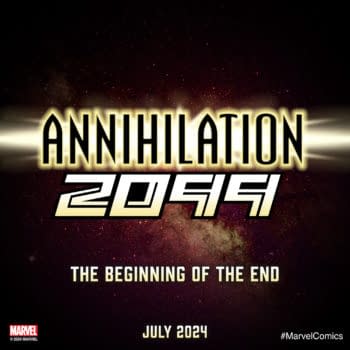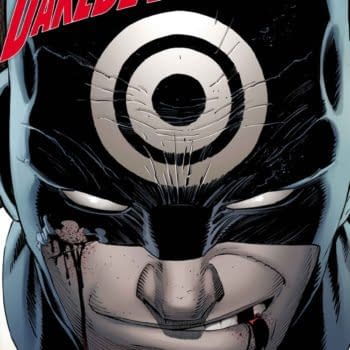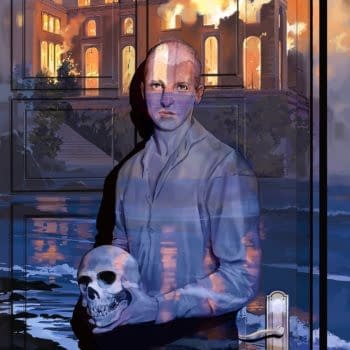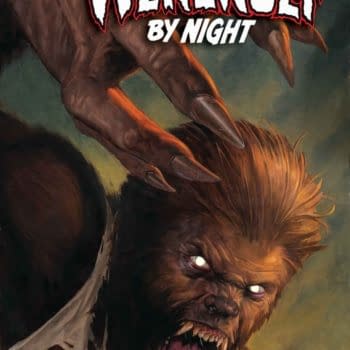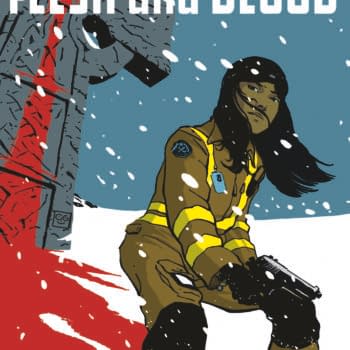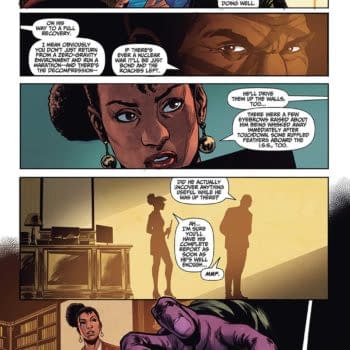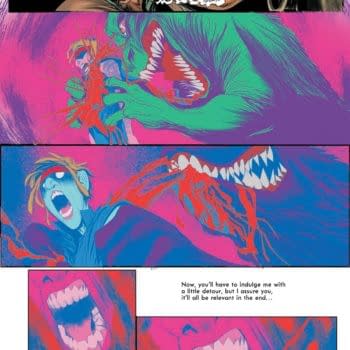Posted in: Comics | Tagged: black, comic con, Comics, entertainment
Asking Why Black Fans Avoid Black Creators At Comic Cons – The Pros Speak
So, a certain Bleeding Cool expose has been making the rounds and creating quite a stir amongst the interwebs. Being affiliated with the Bleeding Cool family and the creators discussing the topic, I felt that there needed to be a lot more detail on this subject given as opposed to the simple touch points previously shown.
I reached out to creators who were willing to go on record with their in-depth thoughts on the matter to possibly shed some light on this divisive subject and possibly make things better for the comics industry as a whole.
Here are those thoughts along with photos provided by the creators themselves.
***
Brandon Easton (Marvel's Agent Carter, ThunderCats 2011, Shadowlaw)
[Copyright Getty Images & Albert L. Ortega]
Brandon Easton is a very busy man, but he had a few moments to recount an experience at Wondercon 2012 he had with Anthony Montgomery (Star Trek: Enterprise) in promoting Miles Away.
While Brandon was used to the comic crowd (and spoke about this topic within his own Fool's Crusade blog), Anthony was used to a different (read: better and more welcomed) experience as a guest at Star Trek related conventions. As the show progressed, Anthony begin to notice something that Brandon already realized: While there was strong interest in the All Ages book, none of the Black attendees would stop. What really stands out and affects the duo to this very day was when a little Black boy stopped, checked out the book, and was excited about it. But upon bringing it to his parents, they quickly took him away from the book and booth.
Why would make Black comic fans go out of their way to avoid Black creators with Black comic characters? How is this different from the television experience with something like Star Trek?
Easton brought up a myriad of reasons. One point being the people behind the material and shown in the material. For comic books, they're traditionally made by White men portraying the exploits of White male characters. In Star Trek, there are multicultural people of both genders and sexual orientations portraying the exploits of the same.
Within comics, the visuals most Black fans are inundated with affect what they follow or show interest in. Easton stated that Black geeks tend to follow White geeks and are quick to show deferment to their tastes. It's a sort of inbred racism or colorism, sort of like an industry wide "Paper Bag Test." Easton says that it seems like if Black geeks at shows see a Black person behind the table (especially with Black characters on the book), they automatically expect it to be trash without giving it second look.
The Big Two of Marvel and DC is another key element that Easton mentioned. "If those two companies went under, there would be no more comics," he said. "They hold our destinies in their hands." As shown by other comic creators, anyone who had books with the Big Two and then goes into their independent title/s are able to parlay a bit of that audience into their own works. This would extend to comic creators of color, too… if Marvel and DC would hire more Black creators to work on their titles.
Other than a life raft from the Big Two, how can Black geeks and Black creators come together? Easton says it needs to come from within. Learning to love themselves will extend to others. But it will take work and time to break down the mental damage created by centuries of misinformation, mistrust, and misrepresentation.
***
Jamal Igle (Molly Danger) had this to say about the subject…
Okay, here's my perspective such as it is: I've worked on black characters for major companies, I've worked on white characters. I've had black people get on my case for both. I had a woman refuse a free Superman comic for her son because she doesn't allow him to read "those" comics. I've been chastised for not "supporting the cause" for creating Molly Danger. I may have been avoided at shows by black people but honestly in the end I feel like it's their loss in the end. I think our goal long term is to appeal to the widest possible audience. However, that takes time, even with Caucasian characters. We can't force people to support us but I also agree you should cut the lip service about there not being enough diversity in comics unless you're willing to put your money where your mouth is.
***
After being asked his take on the situation by multiple parties, Victor Dandridge Jr. (The Trouble w/ Love, The Samaritan) had this to say…
Honestly, I haven't gotten that cold shoulder, but I know I've done it. There's a Pro-Black Assumption that a lot of black, independent creators have, both in the work itself and who wants to read it.
The infused Afro-blackness is a turn-off to the casual reader because they're either a.) not looking for direct representation or b.) don't agree with the "Us vs Them" theology that it belies.
For myself and my work, only The Samaritan would I qualify as a "Black comic" and that's because of the ease or the "urban" tag which has become synonymous with race. But The Trouble w/ Love, which is actually about me and my life, carries a different ethnic cast entirely. It allows for me to find universal audiences and not limit my voice.
***
Though not a Black creator, Brandon Palas worked on what could be considered a "Black book," so his perspective counts…
I can't claim to know anything but my own experience – but in my experience…
The graphic novel series I draw, Legend of the Mantamaji, is a book with a black lead and a diverse cast, by a black creator. At the few cons I've done with Eric, the creator and writer, black people have made up a very large proportion of people who stop by the booth, and a huge proportion of people who buy the books. Many (not just black people but people of color in general) are palpably excited to see a book that represents them. As a white guy, it's been eye-opening. I was pretty aware of the dearth of non-white super heroes, especially in starring roles, but to see in person what it means to people to see themselves represented in the medium they love, after being so desperately underserved since, well, forever – that's something else. I feel privileged to be a part of it.
Of course, some black people aren't interested in what we're selling. That's natural enough. It would be stranger if that weren't the case. But from my own small vantage point, I've seen quite the opposite of what Larry Stroman is talking about.
(Also, Larry Stroman is a badass, and the few issues I had as a kid of his run on X-Factor with Peter David were some of my favorite issues in my collection, and I looked at them constantly.)
***
An outlook from MD Marie (Saints of Winter Valley, Cinders of Angels)…
I really don't pay attention to people ignoring me but I don't think I've had a problem being accepted by black geeks. I know quite a few! They give me a lot of information about the various comic book universes and general comic book history. I'm one of those people that gives them the chance to flex there comic book knowledge.
I have a hard time selling to black conventioneers that are not artists or creators themselves or in the literary field in some capacity. They say they like my concept, but they usually don't buy.
I think young black conventioneers go to integrate with other geeks in general and are not looking for characters they can identify with racially. They're there to find stuff with their favorite popular characters from the big publishers. I find that older geeks look for characters or stories they can identify with but they still want it from the big publishers. They want publishers like Marvel, Dark Horse, and DC to have more ethnic characters. They want to see more black characters working with Superman, Batman, Wonder Woman, the X-men, etc. An excuse I hear a lot is that they're looking for black superheroes like Superman or Spiderman and set in a metropolis, not in the "hood" Africa or a small town no one's heard of; and that's why they don't buy my book. I also believe that there is a stereotype that if you're a black creator, your stories are solely about black subject matter.
***
Art Bellfield (War's Chosen, God Cell, & Battle Eulogy) weighs in on the subject in his own words…
Generally I hate the term "black creators" and "black comic books" because these terms place a limitation into the minds of potential fans and readers. Why? Because for many years black creators were either creating street level heroes who escaped the ghetto or super African mythologies that the general audience had no understanding of not could they relate to-and since most people in America regardless of race are taught European, Greek, Roman, and Norse history and mythology anything outside of that and the weird obsession that nerds have with Japanese culture, they're not going to want to read it.
So, when you are a creator of color and you look at the ones who have successfully made careers in comics like Jimmie Robinson or Fred Perry for example they're not making careers catering to that tiny percent of the audience that wants those types of stories. They're simply telling the stories that they want to tell without forcing their creativity to be placed in a little box. And, honestly I didn't even know they were black until a few years ago and that's how I like it. Creativity shouldn't be attached to a race or gender.
And, many of the same people who would argue against this lack a true understanding of the market and the audience. Like Jay Z said "men lie, women lie, numbers don't."
Now back to the subject at hand: my experience at comic cons when dealing with people of color has been a forced one, because most of them see a black man behind the table and they're with their white friends and are comfortable not being identified as being a person of color with pin their friends eyes. And, if their friends see them interact with black folks, then suddenly shit gets real and their white friends and them will have that awkward moment of clarity where race may indeed be an issue-that's black guilt, the fear of embracing your own people out of fear of being alienated by your white peers!
I made that definition up, but it has some truth to it. I never see black families at cons. Maybe they only exit on the Internet, but I do see black fathers and their sons, which exits me but again… they avoid my table. And, it's not just me. I attended a con where Larry Stroman was there and I kept having to go back and forth to get a chance to meet him because he had a long line of white fans around his table chatting and signing autographs and it was an honor to meet him. There were no black fans lined up to meet him despite there being a good number of people of color in attendance. So, it's not just me if someone on his level can't even get one person of color to go to his table, what hope do the rest of us have? Meanwhile Steve Rude had several black people come and visit his table. It's not his fault nor is he to blame, it's just how things are. Black guilt!
To resolve this we need to be honest, black nerds need to be honest. Most black nerds are the token black dude or girl in their group. They may have some black friend but they're not the people they send just of their time with and if they are they have nothing in common with them do they gravitate toward their white nerdy friends. It's only when they go online that they want to act super black and that's usually in black chat rooms and forums. It's their only time that they can scream Black Power without being accused of hosting white people, or their white wives or girlfriends. It's a comedy show.
Once we are honest with ourselves we need to put our quality products that will appeal to publishers and fans alike and stop trying to cater to a niche market that has no real market share in the industry.
I stated that "black comics" have no market share because no one is cresting comics with black leads currently on a massive level to earn a market share.
To resolve this that black guilt needs to go away, but he'll right now it's hard for black nerds to even date other black nerds, but that's a story for smother day.
***
With that food for thought, I leave the rest up to you, dear readers. What do you look for when you attend shows/conventions? How do you act and interact with those around you on both sides of the convention tables? Matters of race can be touchy subjects, but things of this nature have to be discussed before change and resolution can be attained.
***
Los Angeles born and Midwest raised, B. Alex Thompson is a comic book writer, screenwriter, and letterer who has done work for Alias Enterprises, Approbation Comics, Arcana Studios, Lion Forge Comics, and Graphic Planet. Thompson is mostly known for his experimental action/humor title Chaos Campus: Sorority Girls vs. Zombies and the award nominated drama mini-series Hass. Discover more via www.AlexThompsonWriter.com and Tweet him directly @ApproBAT



















